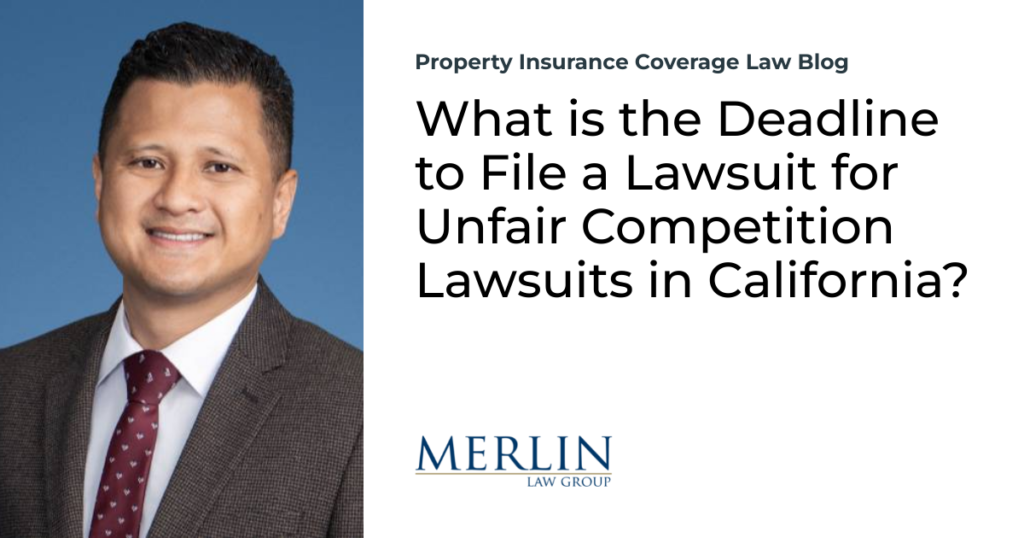What is the Deadline to File a Lawsuit for Unfair Competition Lawsuits in California?

A California appellate court recently held that a homeowner’s policy’s 1-year “Suit Against Us” provision applied to a Plaintiff’s Unfair Competition Claim (UCL) suit instead of the UCL’s statutory four-year limitation period.1 This opinion is an important reminder to always review the policy and be mindful of the One-Year Limitation Provision found in California policies, even if the cause of action does not seek monetary damages.
The case involved a Plaintiff who submitted a claim to State Farm on April 23, 2019, after she noticed a neighbor “had twice slipped and fell when descending the exterior staircase of plaintiff’s home” and later “learned the pitch of the staircase had changed, and the entire staircase needed to be replaced.” Three days after the Plaintiff submitted the claim, State Farm sent a denial letter stating there was “no evidence of a covered cause of loss nor any covered accidental direct physical loss to the front exterior stairway” and also referenced the suit limitation provision. The Plaintiff alleged that State Farm sent the letter “without inspecting the stairs, asking her or her husband any questions, interviewing the elderly neighbor, or contacted any of the contractors involved.”
Plaintiff’s husband, an attorney, contacted State Farm’s agent, and on August 10, 2020, State Farm’s adjuster left a voicemail stating that State Farm had “reopened” the claim. During an August 24 telephone call, the State Farm adjuster denied the claim again, stating “the policy does not provide coverage for preventative nor safety measures to the property” and that “Maintenance would be the responsibility of the property owner to properly maintain the property to keep it safe.”
Plaintiff filed suit on October 22, 2020, seeking declaratory relief and claiming State Farm violated the Unfair Competition Law (UCL). After the trial court dismissed the case because the “one-year limitation provision applied to plaintiff’s claim,” Plaintiff amended her complaint, stating that her claim was “Not a Lawsuit for Damages For Breach of Contract; Rather it Is A Challenge to How State Farm Does Business.” The Plaintiff then sought an on order, in part, requiring State Farm to “identify the applicable reasons(s) for any denial, so that a claimant can evaluate State Farm’s good faith and reasonableness and decide whether and who to submit new of different evidence or argumentation.” The trial court again sustained State Farm’s demurrer on the basis that the one-year limitation provision applied to the plaintiff’s claim. On appeal, the Plaintiff argued that the UCL’s four-year statute of limitations governs and that State Farm had waived the limitations provision when it reopened her claim in August 2020.
The appellate court affirmed the lower court’s ruling. The court quoted Aryeh v. Canon Business Solutions, Inc., 55 Cal.4th 1185, 1196. The majority opinion stated that with respect to the issue of accrual,
[T]hat a cause of action of action is labeled a UCL claim is not dispositive; instead, ‘the nature of the right sued upon’ and the circumstances underlying its invocation control.’ The majority further reasoned that: ‘The alleged acts that form the basis of plaintiff’s UCL claim occurred during the claim handling process, including, for example, State Farm’s alleged failure ‘to investigate all claims made in good faith and reasonable manner,’ its purportedly faulty ‘claims adjudication process,’ and its decision to deny coverage in purported violation of the policy. In plaintiff’s own allegation, the new claim is on ‘State Farm’s claims adjudication process.’ In short, the crux, the gravamen, of plaintiff’s claim arises out of the contractual relationship. It is within the one-year limitation provision.
The dissenting opinion is notable. In addressing whether the UCL is subject to the One-Year Suit Provision, the dissent cited to Cortez v. Purolator Air Filtration Products Co., 23 Cal.4th 163, 178-179 (2000), stating “Any action on any UCL cause of action is subject to the four-year period of limitations created by that section even if the predicate law on which the practice is claimed to be unfair contains a shorter limitations period.” In the dissent’s view: “The ‘crux’ of plaintiff’s lawsuit is that State Farm is marketing homeowner’s insurance to the public, promising benefits on defined terms, while its claims adjustment process is, by design, so superficial (little to no investigation) and obscure (no communication with insureds about the basis for denials) that it manages to avoid paying out on all but the claims that are obviously covered.” The dissent further noted, “Plaintiff seeks only an injunction to rectify those practices on a prospective basis, generally applicable to State Farm’s dealings with all its customers and not limited to her individually.”
The appellate court unanimously rejected Plaintiff’s argument that State Farm did not waive the One-Year Suit Provision when it reopened the claim. The court noted that “Conduct by the insurer after the limitations period has run… cannot, as a matter of law, amount of waiver or estopped.”2 The appellate court also noted that Plaintiff’s waiver argument fails because “the policy requires any waiver to be in writing” and that “reopening a denied claim does not waive a limitations defense.”
The one-year “Suit Against Us” continues to be an important issue regardless of whether the lawsuit is for breach of contract, breach of the covenant of good faith and fair dealing, or a UCL claim. Policyholders, public adjusters, and restoration contractors must be aware that California losses often have a short one-year window to bring lawsuits.
Thought For The Day
The ultimate inspiration is the deadline.
—Nolan Bushnell
1 Rosenberg-Wohl v. State Farm Fire & Cas. Co., 93 Cal.App.5th 436, — Cal.Rptr.3d — (Cal. App. 2023).
2 Id. (Citing Croskey et. al., Cal. Practice Guide: Insurance Litigation 12:1126:10).







